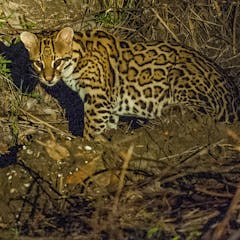
Articles on Captive breeding
Displaying all articles

Just as the world’s zoos breed critically endangered animals in captivity to repopulate the wild, scientists are building a global effort to freeze corals for reef restoration.

New research shows that if captive breeding stopped tomorrow, orange-bellied parrots would soon become extinct. So we’re locked into breeding programs until we can solve the underlying problems.

Habitat protection and restoration, advanced reproductive technologies and reintroduction procedures could help slow the decline of western chorus frogs and other amphibians.

There are so few wild ocelots in the US that the cats are becoming inbred, with a bad prognosis for their ultimate survival. But researchers are perfecting ways to get new genes into the population.

Presenting accounts of technological success in captive lion breeding against the backdrop of rapidly diminishing wildlife loss lets humans off the hook too easily.

Canada needs a national board of advisers to hold Parks Canada’s feet to the fire and shield it from political interference.

Breeding in captivity is expensive, and means the animal’s gene pool will be sorely depleted. Using sperm and egg freezing and IVF techniques can reduce that.

There are more captive tigers in the US than there are in the wild around the world – and they can be bought for less than some breeds of dog puppies.

South Africa has the biggest captive big cat industry in the world and it is largely unregulated.

The world mourns the loss of Malaysia’s last male Sumatran rhino. Can anything stop the slide of the species towards extinction?

While the international conservation community unites against the captive breeding of big cats in South Africa, the government stalls.

The slaughtered tigers were not bred in zoos, yet their story should put captive breeding in general into question.

If we want any future for wild populations of the numerous species traded for pets, exhibits and use in medicines, drastic action is needed to control their international and domestic trade.

Some animals bred in captivity often lack the skills needed to survive in the wild. But the Tasmanian devil is showing it’s a natural born killer.

Computer dating for animals? Finding the right matchup - using DNA rather than personality questionnaires - could help select the best partnerships for captive breeding programs.

Pandas breed in the wild after fighting off competition from other males – something they’re denied in captivity.

Today, many zoos promote the protection of biodiversity as a significant part of their mission. As conservation “arks” for endangered species and, increasingly, as leaders in field conservation projects…





